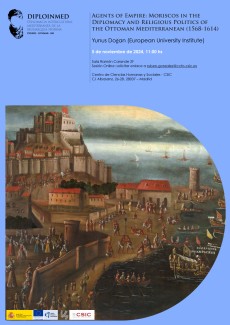Seminarios DIPLOINMED: “Agents of Empire: Moriscos in the Diplomacy and Religious Politics of the Ottoman Mediterranean (1568-1614)”
Sala Ramón Carande 2F y online (solicitar enlace de conexión a ruben.gonzalez@cchs.csic.es)
Por Yunus Doğan (European University Institute)
This project examines the diplomatic and religious roles of the Moriscos in Ottoman Mediterranean policy between the Rebellion of the Alpujarras (1568-1571) and the final expulsion of the Moriscos (1609-1614). It seeks to demonstrate how the Moriscos emerged as significant actors in the complex relations between the Ottoman Empire and European powers in the early modern Mediterranean through a comparative and cross-border approach. It argues that Moriscos-Ottoman interaction extended beyond the Rebellion of the Alpujarras to become part of a long and multifaceted diplomacy that began in the Iberian Peninsula and ended in the Ottoman capital, benefiting both Moriscos and Ottoman authorities.
Building on Spanish, Italian, Arabic, and Ottoman archival sources, this project is divided into three sections, each exploring a distinct period and region. The first one addresses the Moriscos' rebellion in the Iberian Peninsula, highlighting the involvement of the Ottoman authorities in the situation within the framework of the Empire's "soft power" policy on the eve of Ottoman sieges in Cyprus and Tunisia. The second section focuses on the Moriscos' integration into the Ottoman intelligence network. Drawing on case studies from Spanish and Italian archives, it aims to shed light on their role in the Ottoman espionage network and the intelligence-gathering mechanism, with a specific emphasis on their trans-imperial background, regional familiarity, and the extensive webs of personal and political contacts they formed over the years. The third section examines the expulsion period and the Moriscos' migration through Christian territories, such as France and Venice. As is already well-known, the migration and settlement of Moriscos across the Mediterranean created a complex web of alliances, conflicts, and diplomatic manoeuvres that significantly impacted the landscape of international politics in the early seventeenth century. From this perspective, this section delves into an in-depth analysis of the Ottoman sultan's role and, hence, the Ottoman authorities’ involvement in Mediterranean diplomacy on behalf of Moriscos during their passage through Christian territories. In conclusion, this project highlights the significant role of the Moriscos in Ottoman Mediterranean diplomacy, demonstrating their impact on the complex political and religious networks of the era.
Organiza: Rubén González Cuerva (Proyecto DIPLOINMED)



